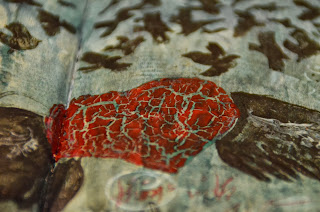und hier noch ein kleiner Ausschnitt von Edgar Allen Poe
Der Rabe
Der Erzähler des Gedichtes hört, als er eines Nachts beim Lesen dem Schlaf schon nahe ist, ein sanftes Klopfen an der Tür. Vom Tod seiner Geliebten Lenore tief betroffen, hat er Trost in der Lektüre seltsamer, möglicherweise okkulter Bücher gesucht, welche seine ohnehin gereizten Nerven weiter angespannt haben. So beschleunigen das Verglimmen des Kaminfeuers und das Rascheln der Gardinen seinen Herzschlag; um sich zu beruhigen, sagt er sich selbst, dass das Klopfen nur von einem späten Besucher stammte. Doch als er die Tür öffnet und dort niemand ist, wecken der Verlust seiner Geliebten sowie die seltsamen Lektüren die irrationale Hoffnung in ihm, dass das Klopfen von Lenore sein könnte. Als er ins Zimmer zurückkehrt, klopft es erneut, diesmal am Fenster. Er öffnet dies und ein stattlicher Rabe fliegt durchs Fenster in den Raum und setzt sich auf die Büste von PallasAthene.
Der Erzähler fragt den Raben nach seinem Namen, doch dieser krächzt nun „Nimmermehr“ (original Nevermore), worauf der Mann zu ergründen versucht, unter welchen Umständen der Rabe dieses Wort erlernt hat und was er damit meinen könnte. Auf die zu sich selbst gemurmelte Aufforderung, Lenore zu vergessen, antwortet der Rabe ungefragt auf ein Neues „Nimmermehr“. Das erregt den Erzähler, und er stellt dem Raben weitere Fragen: Ob es für seine Seele Linderung gebe und ob er Lenore im Himmel treffen werde. Beides beantwortet der Rabe mit „Nimmermehr“. Vollkommen außer sich fordert da der Mann den Raben auf, ihn zu verlassen, doch wiederum antwortet der Rabe in gewohnter Manier und verlässt die Büste nicht. Das Gedicht endet damit, dass der Erzähler beziehungsweise seine Seele in dem Schatten liegt, den der Rabe auf den Boden wirft, und von dort nimmermehr aufsteigen wird.
"The Raven" follows an unnamed narrator on a night in December who sits reading "forgotten lore"] as a way to forget the loss of his love, Lenore. A "rapping at [his] chamber door" reveals nothing, but excites his soul to "burning". A similar rapping, slightly louder, is heard at his window. When he goes to investigate, a raven steps into his chamber. Paying no attention to the man, the raven perches on a bust of pallas above the door.
Amused by the raven's comically serious disposition, the man asks that the bird tell him its name. The raven's only answer is "Nevermore". The narrator is surprised that the raven can talk, though at this point it has said nothing further. The narrator remarks to himself that his "friend" the raven will soon fly out of his life, just as "other friends have flown before" along with his previous hopes. As if answering, the raven responds again with "Nevermore". The narrator reasons that the bird learned the word "Nevermore" from some "unhappy master" and that it is the only word it knows.
Even so, the narrator pulls his chair directly in front of the raven, determined to learn more about it. He thinks for a moment in silence, and his mind wanders back to his lost Lenore. He thinks the air grows denser and feels the presence of angels, and wonders if God is sending him a sign that he is to forget Lenore. The bird again replies in the negative, suggesting that he can never be free of his memories. The narrator becomes angry, calling the raven a "thing of evil" and a "prohet". Finally, he asks the raven whether he will be reunited with Lenore in Heaven. When the raven responds with its typical "Nevermore", he is enraged, and, calling it a liar, commands the bird to return to the "Plutonian shore",- but it does not move. Presumably at the time of the poem's recitation by the narrator, the raven "still is sitting" on the bust of Pallas. The narrator's final admission is that his soul is trapped beneath the raven's shadow and shall be lifted "Nevermore".






No comments:
Post a Comment